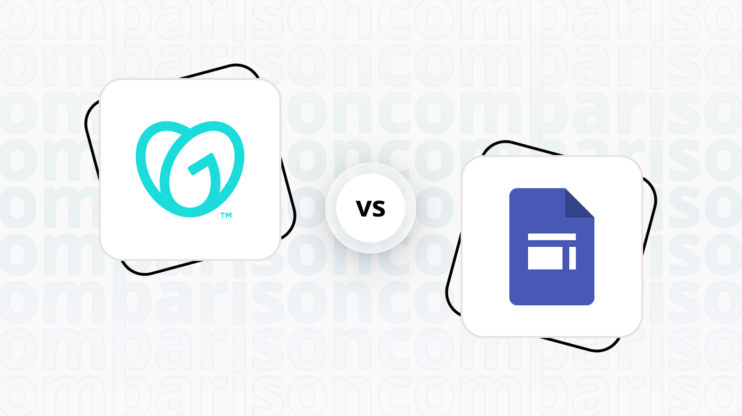Google Sites vs WordPress: Final verdict
Google Sites and WordPress cater to different user needs, each excelling in specific areas.
-
Google Sites (Overall Grade: 5.6/10)
is ideal for users seeking a simple, collaborative platform for creating basic websites. It offers a user-friendly drag-and-drop interface, seamless integration with Google services, and robust security features. However, it lacks advanced customization options and built-in ecommerce functionalities, making it less suitable for complex websites or online stores. When comparing Google Sites vs WordPress, Google Sites is best for team projects, personal portfolios, and small business websites. -
WordPress (Overall Grade: 7.1/10)
stands out for its extensive customization options, powerful plugins, and comprehensive ecommerce capabilities through WooCommerce. It is an open-source CMS that offers flexibility and scalability, making it suitable for a wide range of website types, from blogs to large-scale ecommerce sites. Considering Google Sites vs WordPress, WordPress is the preferred choice for users who need advanced features, creative control, and a robust platform for business growth.

|

|
|
|---|---|---|
|
Design functionalities & templates |
4.9 |
9.0 |
|
Ease of use |
8.3 |
7.2 |
|
Ecommerce |
1.8 |
8.4 |
|
Website Editors |
7.0 |
8.5 |
|
Product testing options |
6.9 |
8.1 |
|
Price |
8.1 |
5.9 |
|
Hosting quality |
8.2 |
0 |
|
Website speed optimization |
3.3 |
6.5 |
|
Plugins/extensions and integrations |
6.4 |
8.8 |
|
Marketing features |
2.6 |
8.0 |
|
Customer support |
7.2 |
5.0 |
|
Website security |
9.3 |
6.7 |
|
AI capabilities |
0 |
6.1 |
|
User Management |
7.8 |
8.8 |
Which one is the best for ecommerce: Google Sites or WordPress?
 1.8
1.8
 8.4
8.4
Verdict
: Google Sites is not designed for ecommerce, while WordPress, with its WooCommerce plugin, excels in providing a comprehensive ecommerce solution.
-
Google Sites
: Google Sites is primarily a tool for creating simple websites and lacks built-in ecommerce features. Users can integrate third-party tools or widgets for basic ecommerce functionality, but it is not ideal for businesses looking to establish a robust online store. When comparing Google Sites vs WordPress, Google Sites falls short in ecommerce capabilities. -
WordPress
: WordPress, especially with the WooCommerce plugin, offers extensive ecommerce features, including multiple payment gateways, abandoned cart recovery, and detailed analytics. It is highly customizable and suitable for businesses of all sizes looking to build a powerful online store.
Which one is the best for informational and business websites?
 7.2
7.2
 9.2
9.2
Verdict
: When it comes to creating informational and business websites, WordPress stands out as the superior choice due to its extensive customization options and robust feature set. Google Sites, while user-friendly and integrated with Google services, falls short in terms of design flexibility and advanced functionalities.
-
Google Sites
: Google Sites is a straightforward website builder that excels in ease of use and integration with other Google services. It is ideal for users who need a simple, collaborative platform for team projects, personal portfolios, or small business websites. However, its limited design functionalities and customization options make it less suitable for more complex informational and business websites. In the Google Sites vs WordPress comparison, Google Sites is best for those who prioritize simplicity and collaboration. -
WordPress
: WordPress is an open-source content management system that offers unparalleled customization and flexibility. It is well-suited for a wide range of website types, including blogs, business sites, and online stores. With a vast array of themes and plugins, WordPress allows users to create highly customized and feature-rich websites. For those looking to build a professional and dynamic informational or business website, WordPress is the clear winner in the Google Sites vs WordPress debate.
Google Sites vs WordPress: Detailed comparison
Design functionalities & templates
Design FunctionalitiesRepresents how well each platform allows for creative design and customization of websites.Score Components:
- Template Variety (30%): Range and quality of design templates.
- Customization (30%): Flexibility and options for design alterations.
- User Interface (20%): Ease and intuitiveness of the design process.
- Responsiveness (10%): Adaptability to different devices and screen sizes.
- Innovation (10%): Unique design features and tools.
 4.9
4.9
 9.0
9.0
🏆
Winner: WordPress.
If you’re looking for a platform that offers more creative control, a wide array of design features, and extensive customization options, WordPress is the preferred choice.
Google Sites offers a limited number of templates suitable for various purposes, from personal blogs to business websites, with both free and premium options available. These templates are designed for user engagement, simplicity, and functionality, allowing for customization to meet specific needs. However, compared to other website builders like 10Web or Squarespace, Google Sites might offer less variety in templates and design customization options.
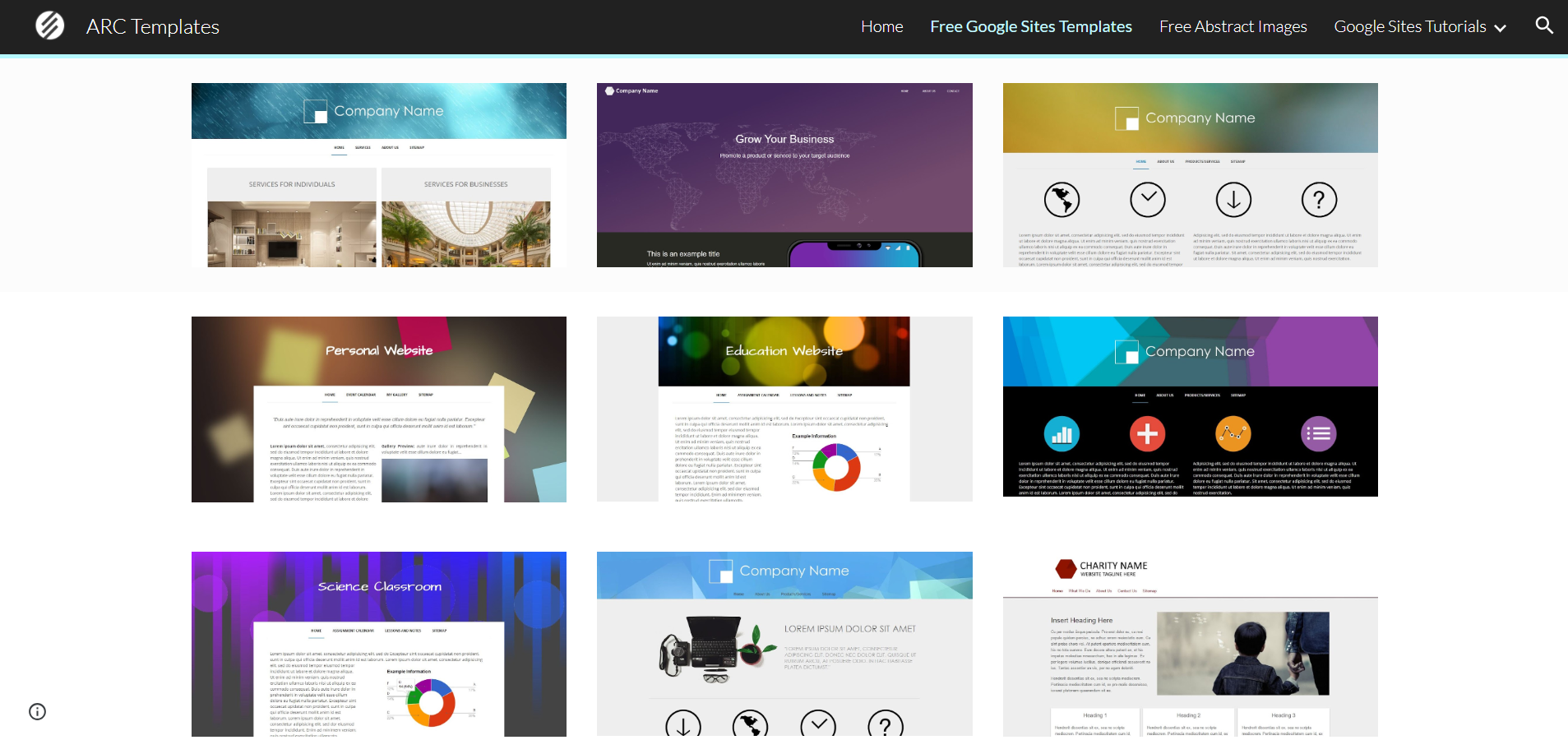

Compared to Google Sites, WordPress offers an extensive variety of templates and designs, catering to a wide range of website types beyond just blogs or ecommerce. Its open-source nature allows for high customization and creative freedom, appealing to diverse user needs. While WordPress itself doesn’t sell premium templates, numerous third-party theme shops offer sophisticated and specialized design choices, expanding the possibilities for users.
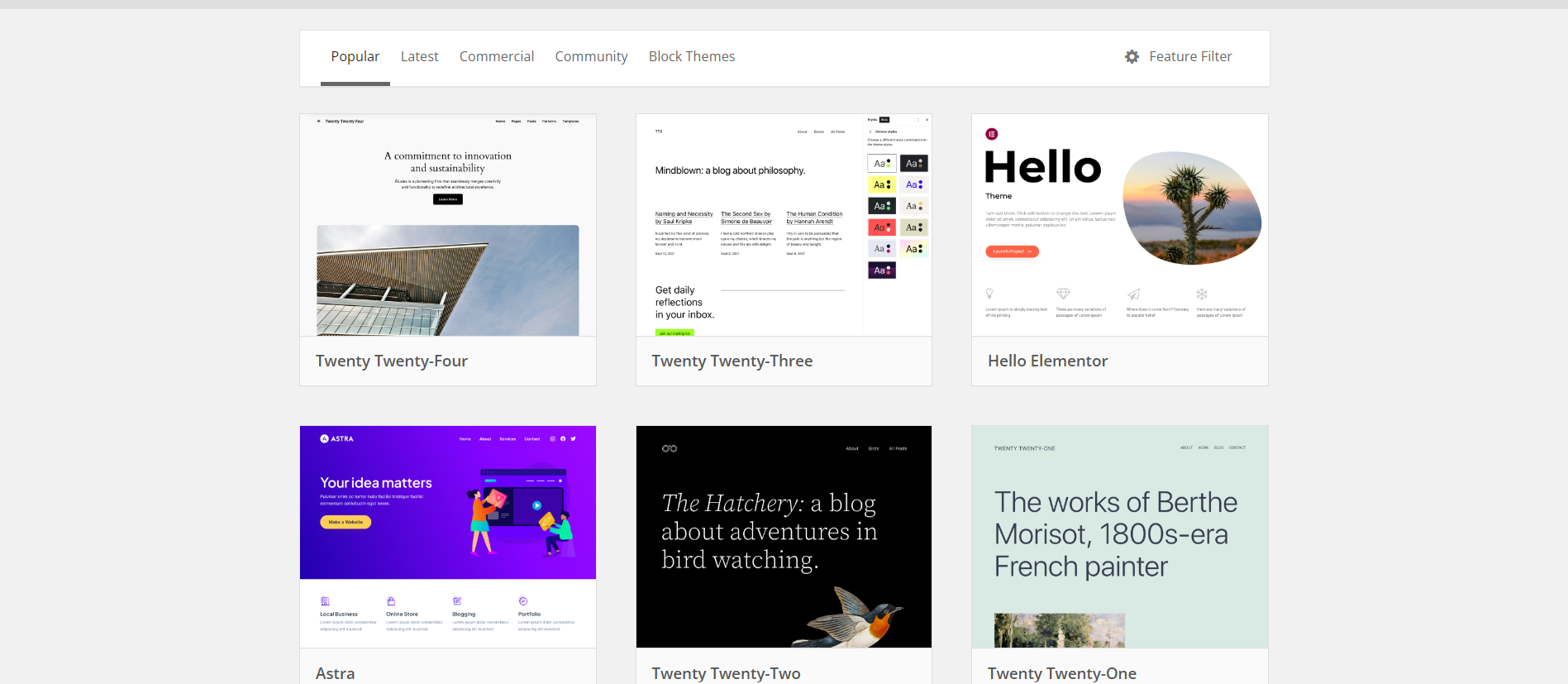

Get a head start on website creation with AI
Create a custom website tailored to your business needs 10X faster with 10Web AI Website Builder!
Ease of use
Ease of useReflects the platform’s overall user-friendliness.Score
Components:
- Learning curve (40%): Quickness and ease of getting started.
- Interface design (30%): Simplicity and intuitiveness of layout.
- User guidance (20%): Quality of tutorials and support.
- Flexibility (10%): Adaptability to various user skills.
 8.3
8.3
 7.2
7.2
🏆 Winner: Google Sites
. With a score of 8.3, Google Sites offers a user-friendly interface and drag-and-drop functionality, making it easy for individuals with no coding experience to create and publish websites. WordPress, scoring 7.2, offers great flexibility and power, but it can be less intuitive for beginners compared to simpler website builders.
Learning Resources
🏆 Winner: WordPress
. Both platforms offer solid learning resources, but WordPress stands out with its vast array of resources, including detailed documentation, community forums, online tutorials, and courses offered by both WordPress and third-party providers.
For ecommerce
EcommerceMeasures the platform’s effectiveness in supporting online business activities.Score Components:
- Ecommerce themes and templates (20%): Variety and design of templates.
- Product management (25%): Ease of managing and organizing products.
- Payment options (25%): Variety and convenience of payment methods.
- Ecommerce features (20%): Features for managing an ecommerce store.
- Integration (10%): Compatibility with external e-commerce tools and services.
 1.8
1.8
 8.4
8.4
When it comes to ecommerce, WordPress outshines Google Sites. WordPress, with its WooCommerce plugin, provides a comprehensive ecommerce solution, while Google Sites lacks built-in ecommerce features.

|

|
|
|---|---|---|
|
Ecommerce themes and templates |
0.0 |
9.2 |
|
Product page customization |
0.0 |
9.0 |
|
Payment processing and commissions |
1.0 |
7.5 |
|
POS capabilities |
0.0 |
6.5 |
|
Payment gateways |
2.0 |
8.5 |
|
Product numbers |
0.0 |
7.0 |
|
Additional ecommerce features |
0.5 |
8.0 |
Google Sites ecommerce features:
Google Sites itself does not have built-in eCommerce features. However, you can integrate eCommerce functionalities into a Google Sites website by embedding third-party tools or widgets, linking to an external eCommerce platform, or using buttons that link to payment processors. For instance, you could use Google Forms for order forms and integrate PayPal or another payment service for transactions. To have a full-fledged eCommerce platform with Google Sites, you’d need to rely on these external integrations or services.
WordPress ecommerce features:
- WooCommerce Integration
- Multiple Payment Gateway Support
- Abandoned Cart Recovery
- Ecommerce Analytics
- SEO Optimization Tools
- Extensive Plugin Ecosystem
Ecommerce themes & templates
Google Sites does not offer any ecommerce templates. On the other hand, WordPress provides hundreds to potentially thousands of ecommerce and WooCommerce specific themes and templates, both free and premium.
Product page customization
Google Sites lacks any product page customization features, as the products can be listed with embedding third-party platforms, all the customization can be done within the mentioned platforms. In contrast, WooCommerce on WordPress offers extensive customization for eCommerce product pages, balancing plugins, page builders, and custom coding. Essential elements include quality product images, detailed descriptions, and effective add-to-cart buttons. Advanced features like product tabs, upsells, and related products are customizable. Tools like Elementor and the Ultimate Product Catalog plugin enhance functionality, but heavy plugin use may affect site performance.
Payment processing
You can integrate payment gateways into Google Sites using external tools or links, not through native features. This can be done by embedding HTML code for payment buttons from services like PayPal, Square, or Stripe, or by linking to an external checkout page. Third-party eCommerce widgets also offer a way to add payment functionalities. However, Google Sites doesn’t offer the comprehensive eCommerce capabilities that dedicated platforms provide.
WordPress doesn’t handle payments directly but offers plugin options for payment processing. Popular gateways include PayPal, Stripe, Authorize.Net, and Square. Choose a gateway based on transaction volume, currencies, fees, and security. Plugins integrate gateways with WooCommerce for a user-friendly setup. Consider options for recurring payments, offline payments, and fraud prevention. Research, read reviews, and start small, scaling as needed.
Website Editors
Website EditorsEvaluates the platforms’ website building and editing capabilities.Score Components:
- Customization tools (40%): Range and power of editing features.
- Editor usability (30%): User experience within the editor.
- Design flexibility (20%): Freedom in layout and design changes.
- Update and maintenance ease (10%): Simplicity of updating and maintaining the site.
 7.0
7.0
 8.5
8.5
🏆
Winner: WordPress
. WordPress, with a score of 8.5, offers a user-friendly interface with block-based editing, extensive styles customization, template management, page editing/creation, distraction-free modes, versatile saving options, and accessibility for users of varying skill levels. It also provides a WYSIWYG (What You See Is What You Get) interface, allowing users to see the end result while designing the website.
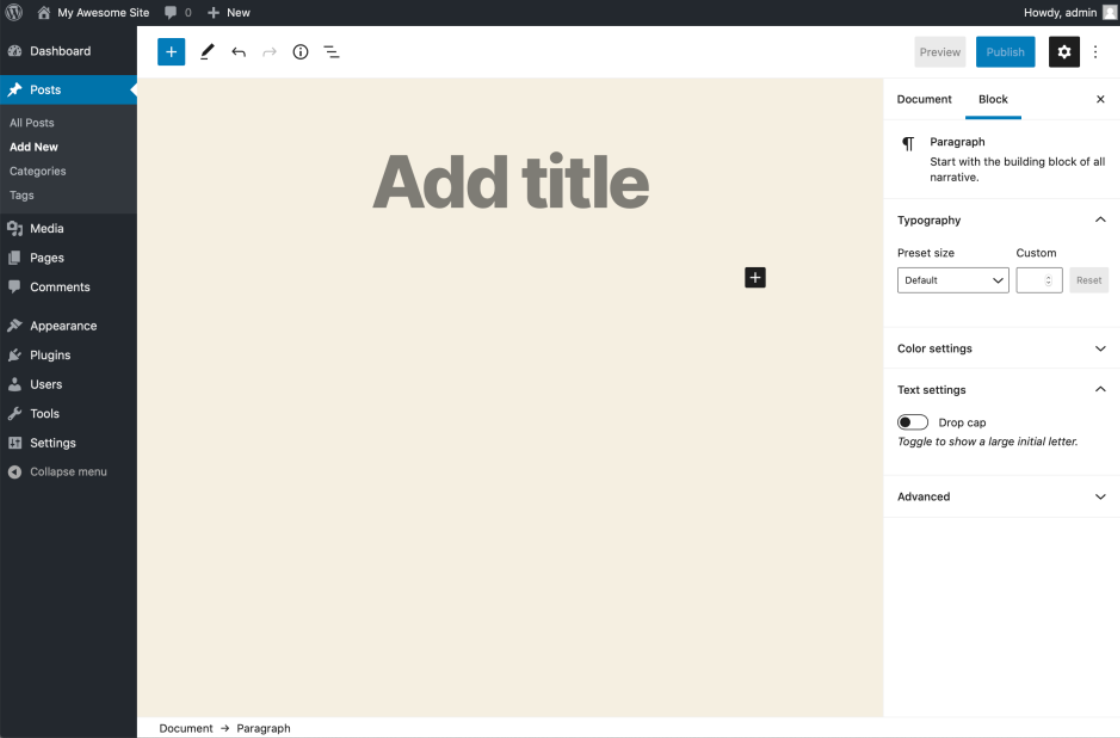
Google Sites, scoring 7.0, offers a user-friendly website builder editor that allows users to create and design websites without needing coding knowledge. With its drag-and-drop interface, users can easily add, customize, and arrange elements such as text, images, and videos on their web pages. It also provides a variety of templates and design options to help users get started quickly and ensure their site looks professional.
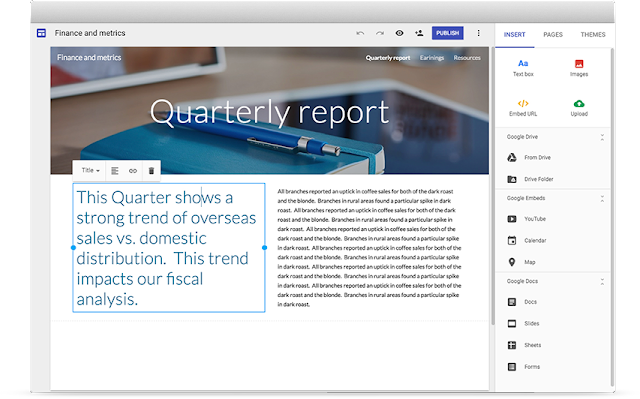
Mobile editor/app
 0
0
 8.1
8.1
🏆
Winner: WordPress
. Google Sites does not offer a mobile editor app, which puts it at a disadvantage compared to WordPress. WordPress, on the other hand, provides a Mobile Editor App that allows users to manage their website on the go.
Users can create and edit posts, manage comments, schedule content, and analyze website traffic from their phone or tablet. While it offers convenience and basic functionality, it has some limitations compared to the web-based editor, including fewer advanced options, restricted code access, and limited design customization.
In summary, WordPress receives a higher rating due to its mobile editor app, offering convenience and basic functionality with some limitations. Google Sites, on the other hand, does not offer a mobile editor app, putting it at a disadvantage.
Product testing options
Product Testing OptionsAssesses the options for trying out platform features before commitment.Score Components:
- Trial quality (40%): Extent and usefulness of the trial or free version.
- Feature accessibility (30%): How many features are available to test.
- Trial duration (20%): Length of the trial period.
- Ease of transition (10%): Smoothness of moving from trial to paid plans.
 6.9
6.9
 8.1
8.1
Overall Result
:
WordPress Wins
. WordPress scores 8.1 in product testing options, while Google Sites scores 6.9. WordPress, being an open-source CMS, offers a free version with extensive customization options. Google Sites, on the other hand, provides a 14-day free trial with the possibility to test some premium features. However, it does not offer a money-back guarantee.

|

|
|
|---|---|---|
|
Free Plan |
Yes |
Yes (open source software) |
|
Trial Duration |
14 days |
No |
|
Testing Premium Features |
Possible within trial period |
No |
|
Money Back Guarantee |
No | Not applicable (open source CMS) |
Price
PriceLooks at the cost-effectiveness and value for money of each platform.Score Components:
- Plan value (40%): What each pricing tier offers.
- Transparency and clarity (30%): Clearness of pricing structures.
- Flexibility of plans (20%): Range of options to suit different budgets.
- Hidden costs (10%): Additional expenses not included in the plan.
 8.1
8.1
 5.9
5.9
Google Sites offers a range of pricing plans, while WordPress is open-source and free, but requires separate hosting services.

|

|
|
|---|---|---|
|
Free |
No offering at this amount. |
Free Plan ($0/month): WordPress is open source software that is free. WordPress does not provide hosting services; so, it is necessary to purchase a domain, web hosting, and website builder subscriptions separately. While WordPress lacks built-in ecommerce, plugins like WooCommerce offer a solution. WordPress offers an extensive variety of templates and designs. WordPress lacks a built-in AI-assisted builder, but its open-source nature allows for an ecosystem of plugins and themes incorporating AI for website building. |
|
$0-$10 |
Business Starter ($7.20/month): This plan includes basic features suitable for individuals or small businesses, offering professional email through Gmail, 30GB of storage per user, and video meetings for up to 100 participants. It allows to manage 1 website and there is no limitation on number of pages. Value for price: 6.0 |
No offering at this amount. |
|
$10-$20 |
Business Standard ($14.40/month): Suitable for growing businesses, this plan provides 2 TB of storage per user, video meeting capacity for up to 150 participants with recording features, and access to smart booking pages and shared drives. It allows to manage 1 website and there is no limitation on number of pages. Value for price: 7.5 |
No offering at this amount. |
|
$20+ |
Business Plus ($21.60/month): Designed for larger businesses needing more robust capabilities, offering 5 TB of storage per user, advanced security options, and video meetings for up to 500 participants. It allows to manage 1 website and there is no limitation on number of pages. Value for price: 8.5 |
No offering at this amount. |
location. As a result in rare cases the prices displayed here can differ from the ones you see on their
websites.
Hosting quality
Hosting
qualityExamines the reliability and performance of the hosting solutions.Score Components:
- Uptime (40%): Consistency and reliability of website availability.
- Speed (30%): Loading times and performance.
- Bandwidth and storage (20%): Sufficiency of resources provided.
- Data centers (10%): Quality and distribution of hosting infrastructure.
 8.2
8.2
 0
0
Winner: Google Sites
. Google Sites offers cloud-based managed hosting with a 99.9% uptime guarantee and data centers across the globe. On the other hand, WordPress does not directly provide hosting services, and the uptime and data centers depend on the hosting provider chosen by the user. Therefore, Google Sites has a higher hosting quality score.

|

|
|
|---|---|---|
|
Do they offer hosting? |
Yes, the platform offers basic storage with 100MB free per site, which can be increased by upgrading to Google Workspace. |
No, WordPress itself does not directly provide hosting services. |
|
Data Centers: |
Google operates a total of 21 data centers across the globe: 2 in Asia, 5 in Europe, 13 in US and 1 in South America. |
Data centers depend on hosting providers. |
|
Type of hosting: |
Cloud based managed hosting |
WordPress itself isn’t a hosting platform, there are various options when choosing the type of hosting for websites built with WordPress, such as: Shared Hosting, VPS Hosting, Dedicated Server Hosting, Managed WordPress Hosting, Cloud Hosting. |
|
Uptime: |
99.9% |
Uptime & uptime guarantee depends on hosting provider. |
|
Uptime Guarantee: |
Yes, 99.9% |
Depends on hosting provider. |
Website Speed Optimization
Website Speed OptimizationEvaluates optimization of website loading timesScore Components:
- PageSpeed Score (30%): Google’s score indicating performance optimization.
- Loading Time (30%): The average time until a website is fully interactive.
- Mobile Optimization (15%): Optimization effectiveness for mobile devices.
- Resource Optimization (15%): Optimizing images, scripts, and other heavy resources.
- CDN Usage (10%): Use of CDN to enhance speed across geolocations.
 3.3
3.3
 6.5
6.5
🏆 Winner: WordPress
Both Google Sites and WordPress place a high priority on website performance and page speed, with Google Sites focusing on automated optimization, CDN, mobile optimization, browser caching, code minification, and use of AMP, and WordPress providing valuable resources for enhancing website’s Core Web Vitals (CWV), however WordPress gets a slight edge when it comes to website speed optimization.

|

|
|
|---|---|---|
|
Focus |
Automated Optimization, CDN, Mobile Optimization, Browser Caching, Code Minification, Use of AMP |
Analyze CWV, Choose a reliable host, Optimize images, Minimize plugins, Use lazy loading, Employ a CDN |
|
Performance Tools |
Google Lighthouse, PageSpeed Insights |
Core Web Vitals, WP Rocket, Hummingbird, AMP |
|
Key Strategies |
Automated Optimization, CDN, Mobile Optimization, Browser Caching, Code Minification, Use of AMP |
WordPress provides valuable resources for enhancing website’s Core Web Vitals (CWV) |
|
Load Times |
Google does not disclose statistics about website Page Speed scores, or load times |
Varies widely, dependent on optimization |
|
Page Speed Scores Range |
Google does not disclose statistics about website Page Speed scores, or load times |
Scores vary; influenced by apps, images |
|
Core Web Vitals Improvement |
Emphasis on LCP, FID, CLS improvements |
Analyze CWV, Choose a reliable host, Optimize images, Minimize plugins, Use lazy loading, Employ a CDN |
WordPress, an open-source content management system, provides valuable resources for enhancing website’s Core Web Vitals (CWV). It suggests to analyze CWV, choose a reliable host, optimize images, minimize plugins, use lazy loading, and employ a CDN. WordPress also recommends tools like Core Web Vitals, WP Rocket, Hummingbird, and AMP for mobile speed. The load times and PageSpeed scores vary widely and are dependent on optimization.
Google Sites, a structured web page-creation tool, focuses on automated optimization, CDN, mobile optimization, browser caching, code minification, and use of AMP for website speed optimization. It emphasizes on LCP, FID, CLS improvements for Core Web Vitals. However, Google does not disclose statistics about website Page Speed scores, or load times.
Get a head start on website creation with AI
Create a custom website tailored to your business needs 10X faster with 10Web AI Website Builder!
Plugins and integrations
Plugins and integrationsMeasures the range and effectiveness of additional plugins and integrations.Score Components:
- Variety of options (40%): Range of available add-ons.
- Integration smoothness (30%): Ease of integrating plugins into the site.
- Quality of plugins (20%): Functionality and reliability of the options.
- Custom integration capabilities (10%): Support for custom or third-party integrations.
 6.4
6.4
 8.8
8.8
🏆 Winner: WordPress.
With a score of 8.8, WordPress outperforms Google Sites (6.4) in terms of plugins and integrations. WordPress offers over 60,000 free plugins, significantly more than Google Sites, and these plugins extend its functionality across various domains, including advanced ecommerce tools, SEO optimization, social media integration, email marketing, website analytics, appointment scheduling, customer support, enhanced media galleries, blogging features, custom forms and surveys, diverse payment processing options, website localization, improved security measures, and the addition of custom widgets. Some of the top WordPress plugins include RankMath for SEO, WP Rocket for caching, WPForms for form creation, UpdraftPlus for backups, EWWW Image Optimizer for image optimization, and WooCommerce for ecommerce integration.
On the other hand, Google Sites also offers a wide array of plugins and extensions to enhance website functionality, catering to various needs such as social media integration, e-commerce, chats, forms, video, audio, and more. Elfsight and Common Ninja offer a wide range of integrations for Google Sites, extending its basic functionalities to include features like social media feeds, review displays, chat support, e-commerce tools, and various interactive widgets. These integrations are designed to enhance user engagement, improve website functionality, and boost sales, making Google Sites a more powerful platform for businesses, educators, and individuals. Both platforms provide easy-to-use, customizable widgets that require no coding knowledge, ensuring that users can significantly enhance their Google Sites without technical difficulties.

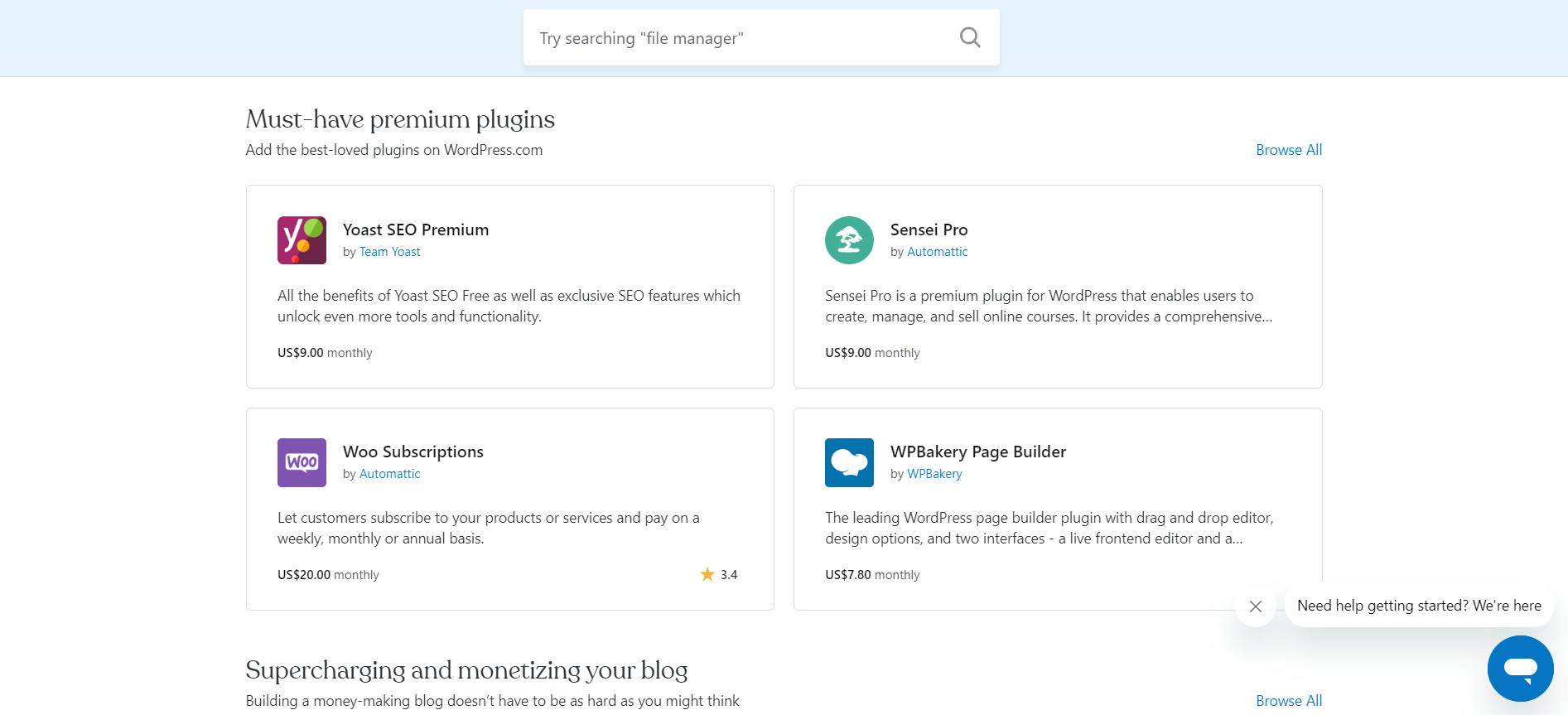
Marketing Features
Design FunctionalitiesRepresents how well each platform allows for creative design and customization of websites.Score Components:
- Template Variety (30%): Range and quality of design templates.
- Customization (30%): Flexibility and options for design alterations.
- User Interface (20%): Ease and intuitiveness of the design process.
- Responsiveness (10%): Adaptability to different devices and screen sizes.
- Innovation (10%): Unique design features and tools.
 2.6
2.6
 8.0
8.0
🏆
Overall Winner: WordPress
. WordPress stands out for its extensive marketing tools, especially in SEO, blogging, and social media integration. Google Sites, while offering basic SEO and analytics features, lacks in email marketing, blogging, and ads and promotions.

|

|
|
|---|---|---|
|
SEO Tools |
Basic SEO settings | Comprehensive SEO tools |
|
Email Marketing |
No | Yes, through plugins |
|
Blogging |
No | Yes |
|
Social Media Integration |
Basic, manual integration | Advanced, through plugins |
|
Analytics and Reporting |
Google Analytics integration | In-depth analysis via plugins |
|
Ads and Promotions |
No | Support for Google Ads and ad management through plugins |
Customer Support
Customer supportEvaluates the quality and availability of support options.Score Components:
- Response time (40%): Speed of support responses.
- Support quality (30%): Effectiveness and helpfulness of the support.
- Availability (20%): Range of support channels (phone, chat, email).
- Resource richness (10%): Quality of self-help and educational materials.
 7.2
7.2
 5.0
5.0
🏆 Winner: Google Sites
. In the comparison of Google Sites vs WordPress, Google Sites takes the lead with a customer support score of 7.2. Google Sites offers a range of support options, including a Help Center, community forums, and direct support for Google Workspace customers. Paid subscribers benefit from 24/7 support for critical issues, making it a reliable choice for businesses needing consistent assistance.
WordPress, on the other hand, scores 5.0 in customer support. As an open-source platform, it lacks direct customer support. Users must rely on community forums, the WordPress codex, and support from hosting providers or plugin and theme developers. While the community is vast and helpful, the absence of official support can be a drawback for users needing immediate or specialized help.
Security
SecurityLooks at the platforms’ security measures and data protection.Score Components:
- Data protection (40%): Safeguards for user and customer data.
- SSL and encryption (30%): Implementation of secure connections.
- Compliance (20%): Adherence to industry security standards.
- Regular updates (10%): Frequency of security updates and patches.
 9.3
9.3
 6.7
6.7
🏆
Winner: Google Sites
. Google Sites, with a security score of 9.3, offers robust measures for data protection and website security. It benefits from Google’s regular security updates, access controls, and compliance with international data protection standards. Google Sites also provides SSL encryption, two-factor authentication, and automatic malware scanning to protect data and users from various online threats.
Although it may not offer the same level of specialized security features as Google Sites, WordPress, scoring 6.7 in security, provides numerous functionalities and resources to enhance website security. However, its approach to private data storage and protection can vary depending on the hosting provider. Users can utilize multiple plugins to bolster security, such as those for site backups, monitoring, malware scanning, user activity tracking, permission control, and spam protection tools. Despite these features, WordPress’s security measures are not as comprehensive as Google Sites’.
AI Capabilities
AI capabilitiesMeasures the effectiveness of AI-driven features and tools.Score Components:
- Automation efficiency (40%): Impact of AI on streamlining processes.
- Personalization (30%): AI-driven customization for users or customers.
- AI-Assisted design (20%): Role of AI in website design and functionality.
- Data analysis (10%): Use of AI in interpreting user data and analytics.
 0
0
 6.1
6.1

|

|
|
|---|---|---|
|
AI Builder |
|
AI Site Builder and Zita plugins offer AI-assisted website building |
|
AI Ecommerce features |
|
AI plugins like Conversios, Ochatbot, AI Power, GetGenie, Woowoo, WooCommerce Multilingual, and SEO plugins such as Rank Math and Yoast SEO |
|
AI Content Generation |
|
AI Engine, GetGenie for content writing, and AI Power: Complete AI Pack for various AI-powered features |
|
Additional AI features |
|
Wide range of AI powered plugins and tools |
🏆 Winner: WordPress
. WordPress, with a score of 6.1, allows for the integration of various AI plugins due to its open-source nature. This includes AI website builders, AI ecommerce features, AI content generation, and additional AI features. On the other hand, Google Sites does not have any AI capabilities.
User Management
User ManagementAssesses the platforms’ capabilities in managing user roles, permissions, and accessibility.Score Components:
- Role Customization (40%): Flexibility in creating and defining user roles and
permissions. - Ease of Management (30%): User interface and tools for managing users.
- Access Control (20%): Effectiveness of access control measures for different user
levels. - Scalability (10%): Ability to manage a growing number of users efficiently.
 7.8
7.8
 8.8
8.8
🏆 Winner: WordPress
. Both Google Sites and WordPress allow multiple users to collaborate on a website, but they offer different roles and access levels.
- Google Sites allows multiple users to collaborate with different roles, including Owners, who have full control, and Editors, who can modify content but not site settings. There’s no strict limit on the number of users who can edit a site, allowing flexibility in management and development. Viewers can only see the site, with no editing permissions. This structure supports collaborative website building with varied levels of access and control for different users.
- The editing access for a WordPress.org website depends on user roles and additional controls. User roles, ranging from Super Admin to Subscriber, dictate the level of permissions, while plugins and controls such as role management plugins and revision control offer further customization for specific editing rights and collaboration.
WordPress User Roles and Access Levels:
| Role | Description | Access Highlights |
|---|---|---|
| Super Admin | Manages the entire network in WordPress Multisite. | Network admin, manage sites, users, plugins, themes. |
| Administrator | Full access within a single site. | Manage plugins, themes, users, all posts/pages. |
| Editor | Manages and publishes content, including others’ posts. | Edit/publish all posts, manage comments, categories. |
| Author | Publishes and manages their own posts. | Write, edit, publish own posts, upload files. |
| Contributor | Writes and edits their own posts but cannot publish. | Write, edit own posts (no file uploads or publishing). |
Additional Features

|

|
|
|---|---|---|
|
SSL Certificate |
|
|
|
Custom Domain |
|
|
|
Free Custom Domain Included |
|
|
|
International Domains |
|
|
|
Mobile Responsive |
|
|
|
Page Speed |
|
|
|
Website Builder Mobile App |
|
|
|
Convert a Website To An App |
|
|
|
Website Analytics |
|
|
|
Multilingual Sites |
|
|
|
Multiple Users |
|
|
Google Sites vs WordPress: User Feedback
Users consistently praise Google Workspace, particularly Google Sites, for its seamless integration, ease of use, and collaborative features, making it a go-to solution for various professional and educational needs. The platform’s simplicity and user-friendly interface are lauded, enabling effortless website creation and sharing of information within organizations. While some users desire more customization options and additional features, overall, Google Workspace remains highly valued for its versatility and streamlined workflow facilitation.
WordPress receives praise for its user-friendliness, cost-effectiveness, extensive themes and plugins, customization options, and supportive community. However, users mention technical challenges, security concerns, a learning curve, and a lack of direct support. Overall, it remains a widely used and versatile platform, especially beneficial for startups and small businesses.
The making of this blog
We followed a clear, step-by-step process to write and research this article.
Google Sites vs WordPress: FAQ
Which platform is better for beginners, Google Sites or WordPress?
Can I use both Google Sites and WordPress for ecommerce?
How do Google Sites and WordPress differ in terms of customization and design flexibility?
What are the major differences in pricing between Google Sites and WordPress?
Which platform offers better support for SEO and marketing?
Can I manage a team with both platforms?
Which platform is more secure?










